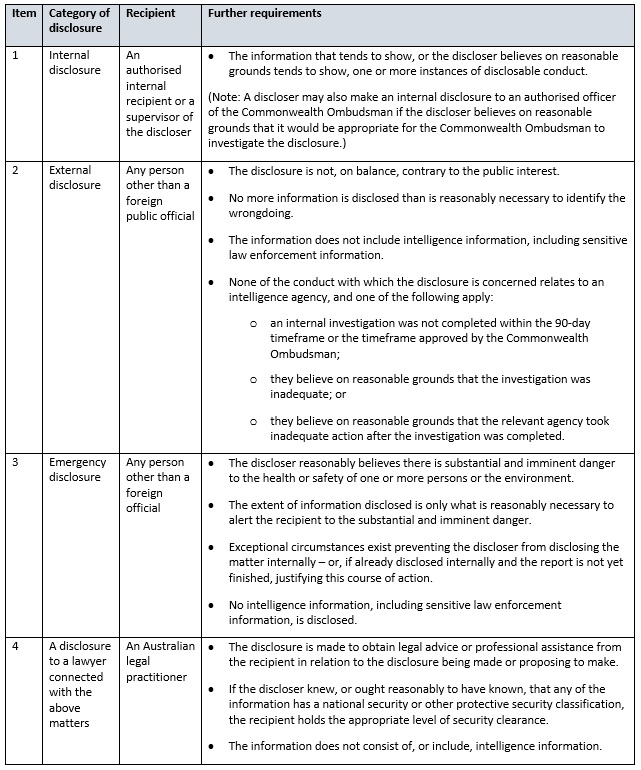- with readers working within the Media & Information industries
- within Finance and Banking, Antitrust/Competition Law and Consumer Protection topic(s)
- with Senior Company Executives, HR and Finance and Tax Executives
The Public Interest Disclosure Act 2013 (Cth) (PID Act) protects public officials who make public interest disclosures in accordance with the PID Act. This article provides a summary of the legislative framework to help you understand the Act.
Overview: What is a public interest disclosure?
Under section 26 of the PID Act, a disclosure is a 'public interest disclosure' if:
- the disclosure is made by a person who is, or has been, a 'public official' (see definition here);
- the disclosure is made in regards to 'disclosable conduct' of the kind outlined here;
- the disclosure is made:
- within the government, to an authorised internal recipient or a supervisor, concerning suspected or probable illegal conduct or other wrongdoing; or
- to anybody, if an internal disclosure of the information has not been adequately dealt with, and if wider disclosure satisfies public interest requirements; or
- to anybody, if there is substantial and imminent danger to health or safety; or
- to an Australian legal practitioner for purposes connected with the above matters; and
- any further requirements, as set out in the table here are met.
Should a public interest disclosure be made out under the PID Act, a number of protections are afforded to the disclosing party, which include:
Who can make a public interest disclosure?
A public interest disclosure can be made by any current or former 'public official'.
A 'public official' is broadly defined in section 69 of the PID Act and includes:
- staff members of statutory agencies (as defined in the Public Service Act 1999 (Public Service Act));
- government departments;
- executive agencies (as defined in the Public Service Act) and authorities prescribed under the PID Act1;
- members of the Australian Defence Force;
- appointees of the Australian Federal Police;
- Parliamentary Service employees (within the meaning of the Parliamentary Service Act 1999);
- directors or staff members of Commonwealth companies, statutory officeholders or other persons who exercise powers under a Commonwealth law; and
- individuals and organisations that provide goods or services under a Commonwealth contract and their officers or employees and subcontractors.
Accordingly, people who can make a public interest disclosure include current or former:
- ASIC staff, including ongoing and non-ongoing staff and staff employed under the Public Service Act before 1 July 2019;
- ASIC Commissioners; and
- service providers contracted or sub-contracted to ASIC and their officers and employees.
A person who is not a current or former public official may also be deemed a public official by an authorised officer if the authorised officer believes on reasonable grounds that the person has information concerning disclosable conduct.
A current or former public official can make a public interest disclosure to ASIC if:
- the disclosure relates to conduct by ASIC or a person working for ASIC; or
- the disclosure relates to conduct by another agency and ASIC is the discloser's current or last agency.
What are the requirements of a public interest disclosure?
There are four categories of public interest disclosure, which have different requirements and depend on the recipient of the disclosure. A high-level overview of the requirements of each category is set out in the table below:

What is disclosable conduct?
'Disclosable conduct' is broadly defined under section 29 of the PID Act. In summary, this includes conduct:
- that contravenes a law of the Commonwealth, a state or a territory;
- in a foreign country that contravenes a law that is in force in the foreign country;
- that perverts, or is engaged in to pervert, or attempt to pervert, the course of justice;
- that amounts to corruption;
- that constitutes maladministration;
- that is an abuse of public trust;
- that fabricate, falsifies or plagiarise scientific research;
- that results in the wastage of public money or property;
- that dangers or increases the risk of danger to the health or safety of one or more persons, or the environment; and
- prescribed by the rules under the PID Act.
Who is required to have engaged in the 'disclosable conduct'?
Under section 29(1) of the PID Act, disclosable conduct may be conduct that is:
- engaged in by an agency;
- engaged in by a public official, in connection with their position as a public official; or
- engaged in by a contracted service provider for a Commonwealth contract, in connection with entering into, or giving effect to, that contract.
Protections offered
Immunity from liability
An individual is not subject to any civil, criminal or administrative liability for making a public interest disclosure. The individual has absolute privilege in proceedings for defamation in respect of the public interest disclosure.
Further, a contract to which a public interest disclosure applies must not be terminated on the basis that the public interest disclosure constitutes a breach of the contract.
Protection from reprisal
It is an offence to take a reprisal, or to threaten to take a reprisal, against a person because of a public interest disclosure (including a proposed or a suspected public interest disclosure).
The act of taking a reprisal or threatening to take a reprisal attracts a penalty of imprisonment for two years, 120 penalty units or both. The threat of a reprisal may be expressed, implied, conditional or unconditional.
Under section 13(1) of the PID Act, a person (first person) "takes a reprisal" against another person (second person) if:
- the first person causes (by act or omission) any detriment to the second person;
- when the act or omission occurs, the first person believes or suspects that the second person or any other person made, may have made or proposes to make a public interest disclosure; and
- that belief or suspicion is the reason, or part of the reason, for the act or omission.
'Detriment' includes any disadvantage, including (without limitation) any of the following:
- dismissal of an employee;
- injury of an employee in their employment;
- alteration of an employee's position to their detriment; and
- discrimination between an employee and other employees of the same employer.
The Federal Court or Federal Circuit and Family Court of Australia (Division 2) may make orders for civil remedies (including compensation, injunctions and reinstatement of employment) if a reprisal is taken against a person because of a public interest disclosure (including a proposed or a suspected public interest disclosure).
Protection of anonymity
It is an offence to disclose the identity of an individual who makes a public interest disclosure. This offence attracts a penalty of six months imprisonment or 30 penalty units, or both. However, a number of exceptions apply (see section 20(3) of the PID Act).
Footnote
1 By virtue of the Public Interest Disclosure Rules 2019, ASIC is a prescribed authority under section 72(1)(p)(ii) of the PID Act.
This publication does not deal with every important topic or change in law and is not intended to be relied upon as a substitute for legal or other advice that may be relevant to the reader's specific circumstances. If you have found this publication of interest and would like to know more or wish to obtain legal advice relevant to your circumstances please contact one of the named individuals listed.


